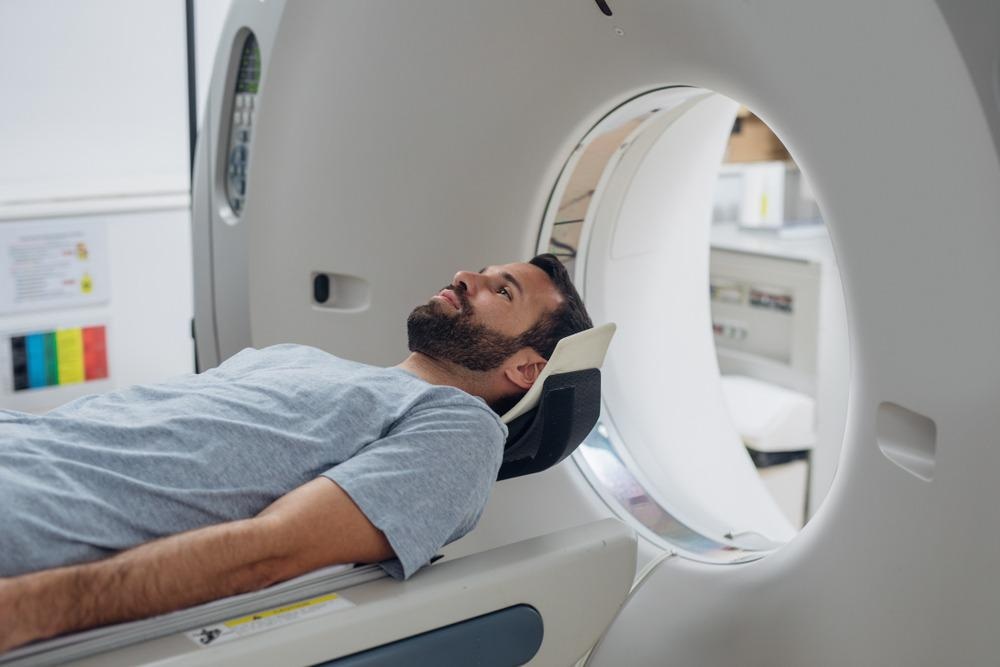Artificial intelligence (AI) was once the subject of science fiction. Now, AI has infiltrated our day-to-day lives in ways that most of us don’t even consider. AI is all around us, from our smart home devices to the targeted adverts we see on social media.

Image Credit: metamorworks/Shutterstock.com
One field benefiting from the adoption of AI, in particular, is medicine. It is changing the way we prevent, diagnose, and treat diseases. Here, we explore how AI is being leveraged to advance imaging technology.
AI and disease screening
AI relies on complex computerized algorithms to analyze data and form conclusions. It lends itself to medical imaging because it is able to use knowledge of an unlimited dataset to make informed conclusions about a new image. The technology is leveraged in disease screening to detect pathology earlier than the trained human eye could automatically. It is also speeding up the process, making it more cost-effective and accessible.
AI is being developed for use alongside a range of different imaging techniques to screen numerous diseases. Here we give examples of some of the most groundbreaking uses of AI in this field.
In 2019, following years of training AI to detect the early stages of lung cancer, Mozziyar Etemadi’s AI technology succeeded in identifying lung tumors more accurately than trained radiologists could. Additionally, the AI system was able to correctly detect early signs of pathology in old CT scans of the chests of patients taken at the time when a doctor’s diagnosis had not been made, but the patients later developed lung cancer.
Also, in 2019, scientists established a deep learning (form of AI) platform capable of screening for diabetic retinopathy and diabetic macular edema. The technology overcomes the limitations of current imaging techniques used to diagnose these eye conditions (optical coherence tomography), which requires trained staff with expert knowledge of the disease. The system may lead to diabetic retinopathy and diabetic macular edema being diagnosed earlier on, resulting in better disease outcomes.
More recently, in 2021, scientists at Technische Universität (TU) Dresden, Germany, succeeded in creating an implantable, bio-compatible AI that can take readings of heart activity in real-time as well as process it and detect pathological patterns. This AI platform will help imaging advance towards hybrid solutions, where AI can be used to enhance the capabilities of traditional imaging. In this instance, the technology can pick up on signs of disease before symptoms may have occurred, bringing these patients to the doctor’s attention for imaging earlier than they traditionally would have.
AI and diagnosis
Similar to disease screening, AI is also helping to diagnose disease earlier, with increased speed and accuracy and reduced reliance on resources, such as trained staff. Diagnostic imaging currently stands as one of the most promising applications of AI in medicine. It has already been developed to improve diagnostic capabilities for various diseases.
For example, scientists have developed a way of improving brain cancer diagnosis via AI. With traditional methods, even experienced doctors are challenged to identify the difference between the presentation of radiation necrosis and brain cancer recurrence on an MRI scan because they look very similar.
Scientists at Case Western Reserve University, Ohio, have established a platform that is trained to spot the distinct radiomic features that are markers of the two different diagnoses but are almost undetectable to the naked eye. Tests showed that their AI system outperformed trained expert neuropathologists in diagnosing radiation necrosis and brain cancer from MRI images.
For decades, researchers have been developing the use of AI and machine learning for computer‐aided diagnosis (CADx) systems for breast cancer. Over the years, AI methods have been designed for CADx, aiming to distinguish between malignant and benign breast lesions. The basis of the technology is that AI is used to automatically characterize the tumor image produced by MRI in terms of size, shape, texture, morphology, and kinetics. The AI then uses this information to estimate the probability of disease. These systems have the potential to pick up on visual indications of malignant tumors that can be missed, even by the trained eye.
This sort of technology has the potential to enhance breast cancer diagnosis so that patients get diagnoses earlier. This is vital for breast cancer and other cancers, as earlier treatment is usually linked to better outcomes.

Image Credit: LStockStudio/Shutterstock.com
The future of AI and medical imaging
While the use of AI in medical imaging has been in development for decades, it is still far from reaching its full potential. AI offers the possibility of limiting human error and enhancing the diagnostic value of imaging techniques. Currently, imaging methods are picking up on key information that isn’t always detectable by experts.
AI could overcome this limitation, enhancing the accuracy of disease screening and diagnosis and improving its speed, and reducing its cost. As a result, treatment may be made available at earlier stages, and survival rates for several diseases may improve.
Sources:
- Cheung, C., Tang, F., Ting, D., Tan, G., Wong, T. 2019. Artificial Intelligence in Diabetic Eye Disease Screening. Asia-Pacific Journal of Ophthalmology 8(2),158-164 journals.lww.com/.../...al_intelligence_in_diabetic_eye_disease.8.aspx
- Cucchi, M., Gruener, C., Petrauskas, L., Steiner, P., Tseng, H., Fischer, A., Penkovsky, B., Matthus, C., Birkholz, P., Kleemann, H. and Leo, K., 2021. Reservoir computing with biocompatible organic electrochemical networks for brain-inspired biosignal classification. Science Advances, 7(34), p.eabh0693. https://www.science.org/doi/10.1126/sciadv.abh0693
- Oren, O., Gersh, B. and Bhatt, D., 2020. Artificial intelligence in medical imaging: switching from radiographic pathological data to clinically meaningful endpoints. The Lancet Digital Health, 2(9), pp.e486-e488. www.thelancet.com/.../fulltext
- Svoboda, E., 2020. Artificial intelligence is improving the detection of lung cancer. Nature, 587(7834), pp.S20-S22. https://www.nature.com/articles/d41586-020-03157-9
Further Reading
Last Updated: Sep 12, 2022